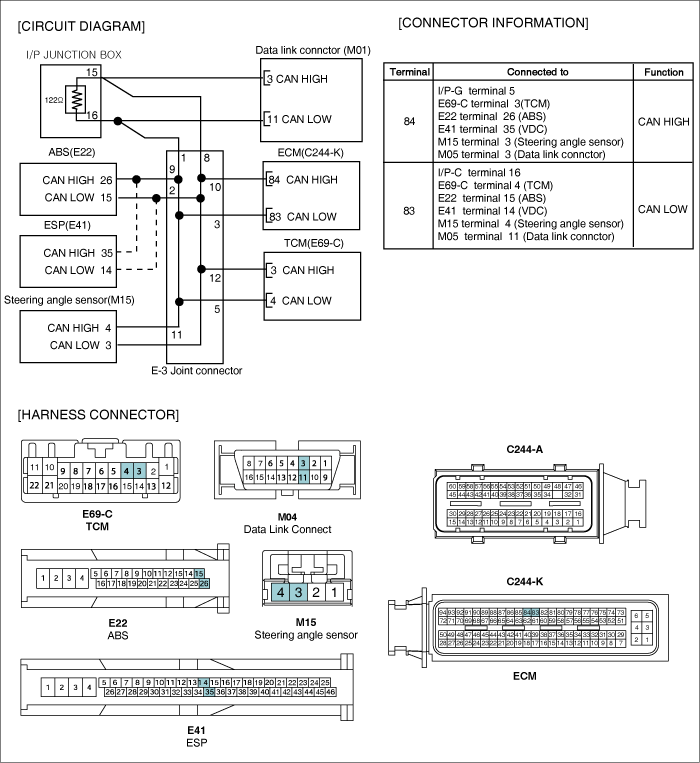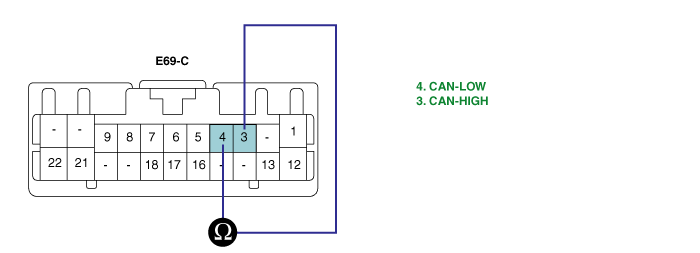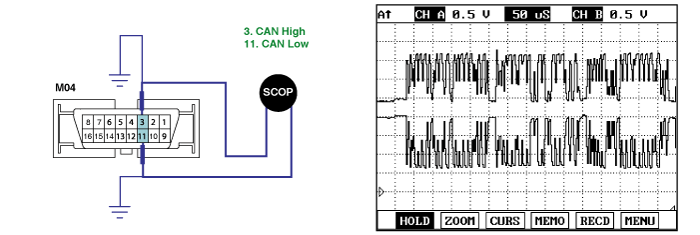Has a problem been found?

▶ Repair as necessary and then go to "Verification of Vehicle Repair" procedure .

▶ Go to "Signal circuit inspection" procedure .
The TCM can either receive data from the Engine Control Module or ABS control module, or it can send data to the ECM and ABSCM by using CAN communication. The CAN communicaton is one of the vehicle communications method, which is now widely used to transfer the vehicle data.
When the TCM cannot read the data from the ECM through the CAN-BUS line, the TCM sets this code.
CAN-BUS circuit malfunctioning or ECM can be a posssible cause of this DTC.
Item | Detecting Condition | Possible cause |
DTC Strategy | ● Check voltage range | ● Open or Short in CAN communication harness ● Faulty ECM ● Faulty TCM |
Enable Conditions | ● Not Fail Safe Status ● IG "ON" ● Ne ≥ 100rpm | |
Threshold value | ● Receive a message "BUS OFF" from CAN MI-COM | |
Diagnostic Time | ● More than 1.5 sec | |
Fail Safe | ● NTELLIGENT SHIFT and is inhibited ● learning for oil pressure control is inhibited ● Torque Retard requirement is inhibited ● direct connection control of TCC is inhibited |


Many malfunctions in the electrical system are caused by poor harness and terminals. Faults can also be caused by interference from other electrical systems, and mechanical or chemical damage.
Thoroughly check connectors for looseness, poor connection, bending, corrosion, contamination, deterioration, or damage.
Has a problem been found?

▶ Repair as necessary and then go to "Verification of Vehicle Repair" procedure .

▶ Go to "Signal circuit inspection" procedure .
Ignition "ON" & Engine "OFF".
Disconnect the "TCM" and "ABS ECM" connector.
Measure Resistence between terminal 3 and 4 of the TCM harness connector.
Specification : Approx. 120 ± 10 Ω

Is measured resistance within specifications?

▶ Substitute with a known-good PCM/TCM and check for proper operation. If the problem is corrected, replace PCM/TCM as necessary and then go to "Verification of Vehicle Repair" procedure.

▶ Check connectors for looseness, poor connection, bending, corrosion, contamination, deterioration or damage of ECM.and then Repair or replace Resistance for CAN communication as necessary and go to "Verification of Vehicle Repair" procedure .
Check CAN communication waveform generation
IG KEY "OFF", ENGINE "OFF"
Disconnect ECM, TCM, ABS(ESP), and Steering angle sensor connector.
Connect 2 channel scope to DLC terminal 3(CAN HIGH) and 11(CAN LOW).
IG KEY "ON" after connecting only "the Control Module(s) to be checked" to CAN BUS.

Specification : At IG KEY "ON", the waveform same as "Signal Waveform & Data" of this code generates.
Different from "Signal Waveform & Data", if 1) both CAN HIGH and LOW signal are fixed at 2.5 V or 2) HIGH and LOW signal are fixed at 3.5 V and 1.5 V, respectively, it is due to communication error between modules.
Does correct waveform generate from each module?

▶ Go to "Verification of Vehicle Repair".

▶ Replace the module which generates poor communication waveform, and go to "Verification of Vehicle Repair".
After a repair, it is essential to verify that the fault has been corrected.
Connect scan tool and select "Diagnostic Trouble Codes(DTCs)" mode.
Using a scantool, Clear DTC.
Operate the vehicle within DTC Enable conditions in General information.
Are any DTCs present?

▶ Go to the applicable troubleshooting procedure.

▶ System performing to specification at this time.